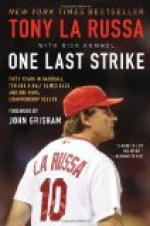Again the wearers of bedraggled blue stockings surged and broke against the line. And again there was no gain. Back of Hillton, less than eight yards away, lay the goal-line. Desperation lends strength. Huddled together, shoulder to shoulder, the backs bracing from behind, the crimson-clad youths awaited the next charge. It was “the thin red line” again. Then back went the ball, there was a moment of grinding canvas, of muttered words and smothered gasps, of swaying, clutching, falling, and “Down!” was heard.
“Hillton’s ball; first down,” announced the umpire.
What a cheer went up from the grand stand! What joy was in Remsen’s heart as the St. Eustace full-back went trotting up the field and Greer stooped over the ball! Then came a pause, a silence. Every one knew what to look for. Squarely between the posts and directly under the cross-bar stood Joel March, his left foot on the goal-line. Back came the ball, straight and low into Joel’s outstretched hands. The line blocked long and hard. One step forward, an easy, long swing of his right leg, and Joel sent the ball sailing a yard over the upstretched hands of the opposing line and far and high down the field.
There it was gathered into the arms of the St. Eustace full-back, but ere that player had put his foot twice to ground he was thrown, and the teams lined up on St. Eustace’s forty-five-yard line. Then it was that the god of battle befriended Hillton; for on the next play St. Eustace made her first disastrous fumble, and Christie, Hillton’s right end, darted through, seized the rolling spheroid, and started down the field. Five, ten, fifteen, twenty yards he sped, the St. Eustace backs trailing after him.
“A touch-down!” cried Remsen. “No, the half’s gaining! He’s got him! No, missed him, by Jove! A-ah!”
The run was over, and Christie lay panting on the ground, with the triumphant St. Eustace half-back sitting serenely on his head; for, although the latter had missed his tackle, Christie had slipped in avoiding him. But cheers for Christie and Hillton filled the afternoon air, and the two elevens lined up near St. Eustace’s twenty-five-yard line, yet well over toward the side of the field.
“If it was only in the middle of the field,” groaned Blair, “a place-kick would tie the score. How much time is there, Mr. Remsen?”
“About two and a half minutes,” answered Remsen. “But I’ve an idea that, middle or no middle, Whipple’s going to signal a kick.”
“It can’t be done,” answered Blair with conviction, “drop or placement! March is only fair at goals, and at that angle—”
“What’s the matter with the man?” cried Remsen; “what’s he up to?” For the Hillton backs were clustered well up behind the line as though for a wedge attack. And as Remsen wondered, the ball was put in play, the line blocked sharply, and Christie left his place at right end, and skirting behind the backs received the ball by a double pass via right half-back and ran for the middle of the field, the backs helping the end and tackle to hold the St. Eustace right line. Christie gained the center of the gridiron and advanced a yard toward the opponent’s goal ere the St. Eustace right half-back reached him. Then there was a quick line-up, and Joel took up his position for a kick.




